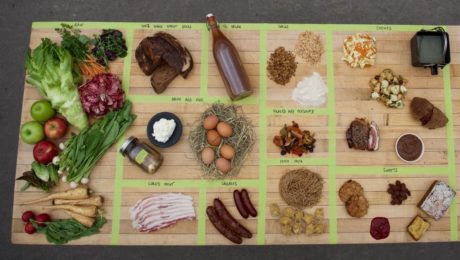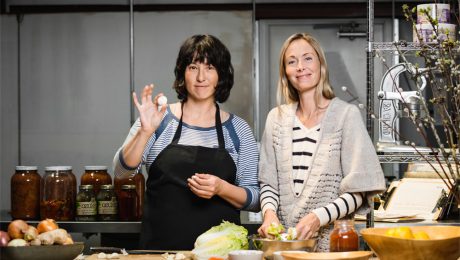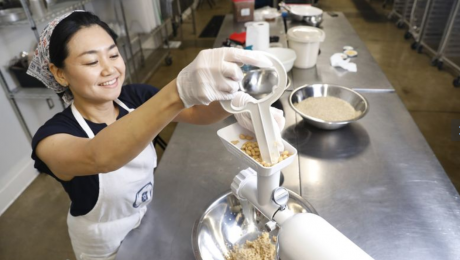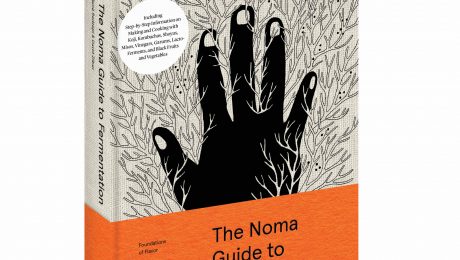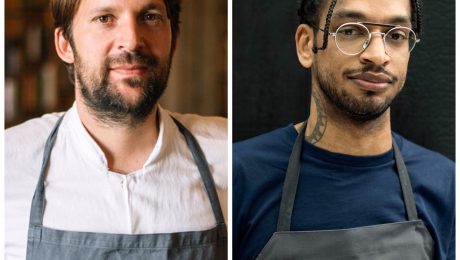Fermentation Helps Blue Hill Support Farmers
In an effort to help struggling farms during the coronavirus pandemic, Blue Hill at Stone Barns is expanding their fermentation program.
The upscale restaurants (Blue Hill in Manhattan and Blue Hill at Stone Barns in Westchester County) have long been at the forefront of farm-to-table dining. But, like all restaurants in New York, Blue Hill closed in March when the coronavirus pandemic broke out. Though co-owners Dan and David Barber are confident the traditional restaurant model will once again return, the brothers are troubled by the catastrophic impact on farms.
Blue Hill Farm and Stone Barns Center (a non-profit farm and educational center) have partnered to form a new entity resourcED, which surveyed over 500 farmers. A key conclusion — over a third of farms will not survive the pandemic. August sales at farms are expected to be down by 50% due to the COVID-19 pandemic, and over 30% of farmers say they are struggling to cover expenses.
“The excess product is a huge concern. That’s shaped our box program, our fermentation program,” says Andrew Luzmore, Blue Hill’s market forager.
The resourcED survey was the impetus at Blue Hill to launch their picnic dining and box program. Diners can buy a picnic dinner and eat a farm-to-table meal on the farm’s patio or lawn (physically distanced from others), still allowing Blue Hill to purchase food from local farmers. This program allows consumers to pick-up a box full of produce, dairy products, seafood or meat, all sourced from local farms.
Blue Hill’s mainstay fermentation and preservation programs, used for over 15 years to maintain food flavor and nutrients through long Northeastern winters, have also been expanded, to absorb more of excess farm production.
“The focus on preservation program is bred out of necessity, and necessity breeds creativity,” says Cortney Burns, chef, fermentation consultant for Blue Hill and author of “Bar Tartine, Techniques & Recipes” and the forthcoming “Nourish Me Home.” “What we’re doing now with fermentation at Blue Hill rides on the coattails of what has been part of the backbone of Blue Hill for years. Working here has me looking at fermentation through a different lens these days. How can we be completely in service to good agriculture? How can we create a greater economy for farms?”
Adds Luzmore: “The fermentation program has definitely expanded a lot. We’re shifting more to helping farmers with excess product.”
For example, Blue Hill recently purchased napa cabbage that would have been wasted from a Hudson Valley farmer. They are fermenting the cabbage, “making a delicious, nutritious probiotic-rich food for our diners, whilst buying up overabundant harvests,” Burns notes.
It’s conscious cooking, Burns says “We’re not just buying for the sake of preservation. We want to create variety.” Another example is how the Stone Barns Center is trialing preserving different beet varieties.
Fermented grapes and capers, buckwheat vinaigrette, peach umeboshi and whey tonic are among the creations Blue Hill has served picnic-style and in boxes. Some of the fermented food being offered is purchased from local farmers. Local cultured dairy — such as farm fresh cheese and yogurt — makes up a large percentage of their dairy box, for example.
“There are all these different ways we’re harnessing the power of fermentation,” Burns says. “We’ve had to shift our expectation of a restaurant kitchen. We need to make sure that first, the food doesn’t spoil, and second, that we have lots of probiotic rich food loaded with flavor to serve people.”
A picnic meal at Blue Hill is $195 per person and the boxes range from $45 to $170. Blue Hill is also donating boxes to families with food insecurities.
Luzmore hopes other restaurants will innovate ways they can support local farms during the pandemic. “It’s almost impossible to buy exactly the amount a restaurant needs, especially now when there’s a greater need to support farms. Considering the constant and changing flux of product coming into the restaurant for the boxes and donations, fermentation allows for a more holistic approach of using excess product.”
“Chef Dan [Barber] has said many times throughout the launch of resourcED: we’ve kind of gone from being a restaurant to a food processing facility. Blue Hill is a fine dining restaurant. We still maintain that mentality and quality, but it’s at a different level. The scale, we’re now thinking of purchasing pallets instead of pounds.”
- Published in Business
MSG Myth Busting, Award-Winning Chefs Tout Benefits of Flavor Enhancer
In the next wave of “health” advocates slamming MSG, this week customers are upset Chick-fil-A includes MSG in their fried chicken. MSG often gets a bad rep as a preservative, but it’s a sodium salt naturally occurring in the human body and in whole foods (like tomatoes, mushrooms and potatoes). MSG is a umami-packed flavor enhancer that can be made as a flavoring agent through a fermentation process. Award-winning fermentation chefs like David Chang of Momofuku and David Zilber of NOMA use MSG in their dishes. A Today show article busts some of the common myths around MSG.
Read more (Today)
- Published in Food & Flavor
Master Fermenter David Chang’s Media Empire Expands to Hulu Food-Centric Talk Show
Superchef David Chang is transforming his restaurant business into a multimedia empire. The restauranteur, author, publisher, TV celebrity and podcast host announced this month that he’s adding another television gig to his resume: “Family Style.” Chang will co-host the food-centric talk show with celebrity and cookbook author Chrissy Teigen.
“We’re not trying to promote the restaurant; we’re trying to promote our ideals. And I think, to the younger generation, that’s more important to them than ever before,” Chang said at Recode’s Code Conference.
The Korean-American founder of Momofuku restaurant is known for shaking up the restaurant industry with cutting-edge culinary innovations. A major proponent of fermentation, Chang’s innovation in the cooking technique has propelled fermentation’s recent renaissance in America. In his Kaizen Trading Company fermentation lab, Chang develops his own line of fermented products for restaurants.
Chang aims for his media projects to reflect the values of the restaurants he’s created all over the world – authentic and honest. He compared starting a food-based media company, Majordomo Media, to chef Wolfgang Puck’s entrepreneurship. Puck “created a giant business of every kind of thing related to food,” like consumer-packaged goods, cookware and catering.
“If the media takes off, that’s more stuff we can bring back to the restaurants,” Chang said. The media arm feeds his restaurants. “Maybe people will never want to pay that much money for [Momofuku] food, maybe we can subsidize some of the costs with [the media projects] that’s alleviating our bills.”
Changing Kitchen Atmosphere
Majordomo Media produces the Netflix series “Ugly Delicious” and the podcast “The David Chang Show.” Chang won’t discuss viewership numbers. But he says the exposure has made Momofuku busier than ever, and that’s not because the restaurant is featured heavily in the TV show. It’s the message about the food industry and corporate responsibility that sticks with viewers, piquing their interest in Momofuku.
“Everyone has an understanding of food now; the food awareness is higher than ever before,” Chang said. “But no one quite wants to understand how that food gets made. They understand maybe from an environmental perspective, but they don’t understand it from a restaurant perspective.”
Customers should make themselves aware of restaurant ownership, especially in a post #MeToo world when sexual assault accusations have put into light the deplorable behavior of restauranteurs like Mario Batali.
Important, too, are proper working conditions. The culinary industry is historically a “brutish system,” Chang said. The hours are long and tiring. Today’s labor force is changing workplace culture, though. Millennial employees are disrupting the horse race work pace, they are “allergic to the working conditions and the stress that we were creating.”
“You work long hours in the culinary world, and I’ve always believed that the culinary world and those that lead people in the culinary world have maybe one of the hardest jobs because you can’t motivate people with a giant stock option package or a giant bonus that you might get on Wall Street. You have to motivate someone to do physical hard labor and to try and get better at that through sheer integrity and personal will and that’s hard, that’s incredibly hard to motivate people,” Chang said.
He added: “How do you balance out what’s essentially still a blue-collar labor, which is cooking, [that] is now glamourized to a point that it now has white-collar values? That’s a collision that’s hard to mitigate and sort out.”
Chang’s creating that white-collar environment at his restaurants, giving vacation days, mandatory breaks and a shift drink at the end of a service. He wants to professionalize the restaurant industry when, historically, it’s never been professional.
“I’ve been so allergic to a corporate body for so many years, but now I think I’ve convinced myself it’s the only way to go,” Chang said.
Experimental Triumphs & Failures
Lauded as the bad boy in the food world, Chang is a chef willing to take unapologetic risks. His innovation has not come without failures, though. Lucky Peach, the award-winning food magazine he co-founded, shuttered after creative differences. Maple, a New York food service Chang backed that prepared and delivered gourmet food, folded amidst massive debt. Ando, another Chang backed food delivery service, suddenly closed, then was acquired by Uber Eats. Chang closed Má Pêche last year, citing declining foot traffic around New York’s midtown thanks to extra security at Trump Tower. New York Italian restaurant Momofuku Nishi closed too after a touch review, then remodeled and reopened.
That review – by Pete Wells of the New York Times – was Momofuku’s first bad review. It destroyed the restaurant, Chang said. But he added that he’s weirdly thankful for that review because it helped Momofuku reevaluate, “our restaurants around the world are doing better than before because of that review.”
“My fear is that once you become too systemized in the restaurant industry, you’re going to lose any of the coolness, creative parts,” Chang said. “I got into cooking because it wasn’t cool. Everyone thought it was career suicide when I said ‘Hey I’m going to start to cook,’ it was sort of that sense of danger, that sense of recklessness that no longer really exists.”
“It’s completely different than a tech business because scaling a brand in food, yes, it can work in McDonald’s or if you have a beverage,” Chang said. “But the idea of scaling something that’s intimate, some kind of contract between you and a prospective diner, that’s hard because we’re still trying to be best in class in making the most thoughtful, delicious food and it’s hard to scale excellence I think.”
(Photo by Wall Street Journal)
- Published in Food & Flavor
World’s Best Female Chef Always Stocks Her Fridge with Ferments
Chef Daniela Soto-Innes — who runs New York City’s top modern Mexican restaurants Cosme and Atla — has been named the World’s Best Female Chef, by the same group that names the World’s 50 Best Restaurants. The 28-year-old is the youngest recipient. A fan of fermentation, Daniela says her fridge is always stocked with ferments (“like kimchi and different types of bacteria, to help with digestion”). She serves a unique variation of tepache at her restaurants, a lacto fermented beverage made with pineapple rind, piloncillo and canela.
Read more (Wall Street Journal)
- Published in Food & Flavor
Ozukè Founder: Fermentation Will Change Diet & Planet
Blending ancestral kitchen traditions and new scientific research will allow fermentation to change our diet — and our planet.
In a TEDx Talk, Mara King, co-founder of fermented food store Ozukè, shares why she is proudly releasing trillions of good bacteria into the population. Her food philosophy rubs against everything the Food and Drug Administration and state health departments practice. While government agencies enforce strict sanitation standards in the name of protecting American’s food, King preaches that it’s wiping out good bacteria and dumping more toxins into the environment.
When King and co-founder Willow King (no relation) opened their Colorado-based food business, a food scientist from the Denver office of the Health & Human Services Department performed a safety inspection. The food expert was confused by Ozukè’s live, fermented pickles, sauerkraut and kimchi. King: “He said ‘Your product is so weird. We follow all these FDA guidelines in food manufacturing in order to diminish bacteria and here you are making it on purpose.’”
“The food we make is actually super, super, super safe, unlike mots processed packaged fresh foods,” King says. “The reason this food is so safe is not because I’m better at this antimicrobial Macarena than anybody else. It’s because the bacteria are doing the work of making the fermented foods pretty much bomb proof.”
Though numerous cultures have been fermenting for generations (“It’s how humans have been eating raw, crunchy vegetables all through hard winters.”), King notes it’s only in the last 10 years that scientists have been able to map the complex fermentation process. By letting bacteria thrive in its own ecosystem, it “creates a food that’s no longer harmful to humans” and makes a more nutritious product.
“Nature does not operate in a vacuum and neither should we,” King says. “We need to understand the complexity of the world in which we live, then we can start to come up with solutions that do honor our heritage.”
King, who great up in Hong Kong, says older Chinese women store an impressive knowledge of food and medicine. Merging ancient tradition with new science is what will create the living solutions needed to continue living on our planet.
“In fermentation, we have a little trick that we use which is called using a started culture or a mother. I believe that our starter culture…is our human cultural history,” King says. “Once we start tapping this information…we’ll start to come up with amazing solutions, solutions that grow, solutions that rot, solutions that breath.”
Today Ozuke (which means “the best pickled things” in Japanese) still makes pickled veggies, but also teaches fermentation workshops. For more information, visit their webpage.
- Published in Food & Flavor, Health
The Art of Making Traditional Miso
Today most miso is industrially produced, but one of the most popular miso vendors in Los Angeles still uses traditional Japanese techniques to ferment miso paste, “recapturing the individuality of miso” according to the Los Angeles Times. Ai Fujimoto, who owns Omiso restaurant in the Hollywood Farmers Market, has fermented over 350 pounds of handmade soybean paste this year. The paste ferments for a few months for a light miso and ferments for over a year for dark miso. Each batch is different, “That’s what I love about it” Fujimoto says. She rents space at a commercial, shared-use kitchen to make her soybean paste. She enjoys experimenting with new recipes, even using recipes from YouTube videos.
Read more (LA Times) https://goo.gl/72muVk
- Published in Food & Flavor
Redzepi: “Fermentation is a Field That’s Going to Keep Growing”
René Redzepi and David Zilber’s new book, “The Noma Guide to Fermentation,” could have been a vegetarian cookbook, since vegetarianism is trending. That would have been easy. But Redzepi “was very adamant that fermentation is a field that’s going to keep growing, and a book like this is going to help push it forward.” Fermented ingredients now surpass foraged ingredients as “the most important elements” in the pantry at Noma, the fine-dining restaurant in Copenhagen that has been named the world’s best restaurant four times.
Read more (Washington Post)
- Published in Food & Flavor
Noma’s Rene Redzepi & David Zilber Speaking in on U.S. Book Tour
René Redzepi and David Zilber will speak across the U.S. on their book tour. Redzepi (chef and co-owner of Noma in Copenhagen, recognized as one of the world’s best restaurants) and Zilber (chef at Nima who runs the fermentation lab) will talk about their new book “The Noma Guide to Fermentation.” The book is also available for preorder on Amazon. Here’s a list of their full tour:
Sunday, October 14 – Toronto
7:00 p.m. at The Isabel Bader Theatre
Presented in partnership with Indigo Books & Music
Details and tickets here
Monday, October 15 – Seattle
6:30 p.m. at The SIFF Cinema Egyptian
Presented in partnership with Book Larder
Details and tickets here
Tuesday, October 16 – San Francisco
7:00 p.m. at JCCSF
Presented in partnership with Omnivore Books
Details and tickets here
Wednesday, October 17 – Los Angeles
8:00 p.m. at the Ann and Jerry Moss Theatre
Presented in partnership with Barnes & Noble
Details and tickets here
Friday, October 19 – Minneapolis
6:30 p.m. at the American Swedish Institute
Details and tickets here
Saturday, October 20 – Chicago
3:00 p.m. at Venue West
Presented in partnership with Read It and Eat
Details and tickets here
Monday, October 22 – New York
7:30 p.m. at the 92nd Street Y
Presented in partnership with Kitchen Arts & Letters
Details and tickets here
Tuesday, October 23 – Washington, DC
7:00 p.m. at Lisner Auditorium
Presented in partnership with Politics & Prose
Details and tickets here
Wednesday, October 24 – Philadelphia
7:30 p.m. at the Free Library of Philadelphia
Presented in partnership with Joseph Fox Bookshop
Details and tickets here
Meet David Zilber – Additional tour dates
Please note the following dates are with appearances by author David Zilber only:
Thursday, October 25 – Philadelphia
10:00 a.m. David Zilber in conversation with Jeff Gordinier, Esquire food editor, at Drexel University
Details and tickets here
Friday, October 26 – Boston
12:30 p.m. David Zilber in conversation with Dr. Pia Sorensen, Harvard University Lecturer on Science and Cooking, at
First Parish Church, Cambridge
Presented in partnership with Porter Square Books
Details and tickets here
Saturday, October 27 – Montréal
2:00 p.m David Zilber in conversation with chef Jonathan Cheung at Appetite for Books
Details and tickets here
- Published in Food & Flavor
Anthony Bourdain On a Fermented Future
We’ll remember Anthony Bourdain for opening our eyes to new foods and cultures. This time last year, the culinary TV host declared fermented food as America’s future, adding: “That funk. That corruption of flesh. That’s exactly the flavor zone that we’re all we’re all moving toward.”
- Published in Food & Flavor
Getting Salty with Lauren Friel, who’s opening wine bar Rebel Rebel at Somerville’s Bow Market
Boston wine guru Lauren Friel says, to fix the local restaurant industry, health codes need to be revised. Friel says food regulations restrict chefs from using ferments and cured meats, making it especially difficult to serve authentic Chinese or European food.

